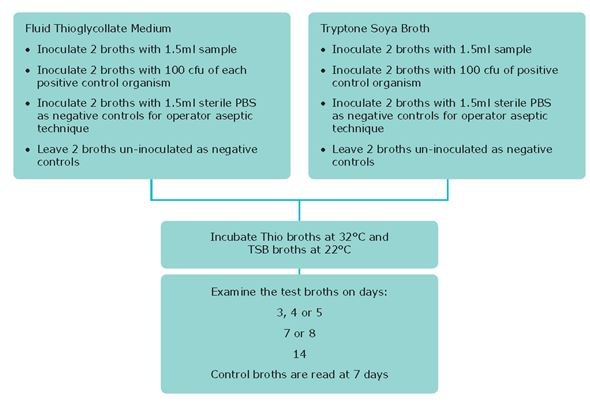Testing Cells for Bacterial and Fungal Contamination

In cases of gross cell culture contamination, the naked eye may identify the presence of bacteria and fungi. However, in order to detect low-level infections the method above is recommended.
Materials
- Aerobic nutrient broth (Tryptone Soy Broth (22092))
- Anaerobic nutrient broth (Thioglycollate Medium (T9032))
- Positive control organisms e.g.
- Bacillus subtilis NCTC*
- Candida albicans NCTC*
- Clostridium sporogenes NCTC*
- * Available from the National Collection of Type Cultures (NCTC)
Equipment
- Personal protective equipment (latex medical gloves, laboratory coat, safety glasses)
- Waterbath set to 37 °C
- Microbiological safety cabinet at appropriate containment level
- Incubator set at 32 °C
- Incubator set at 22 °C
Procedure
- Culture cell line in the absence of antibiotics for 2 passages prior to testing.
- Bring attached cells into suspension with the use of a cell scraper. Suspension cell lines may be tested directly.
- Inoculate 2 x aerobic broths and 2 x anaerobic broths with 1.5mL test sample.
- For each of the positive control organisms inoculate 2 x aerobic broths and 2 x anaerobic broths (e.g. 0.1mL control at 100 cfu per broth).
- Inoculate 2 x aerobic and 2 x anaerobic broths with 1.5mL sterile PBS
- Incubate broths as follows:
• Incubate Thio broths at 32 °C and TSB broths at 22 °C - Examine the test broths on days:
• 3, 4 or 5
• 7 or 8
• 14
• Control broths are read at 7 days
Criteria for a Valid Result
All positive control broths show evidence of bacteria and fungi 7 days of incubation and
the negative and PBS control broths show no evidence of bacteria and fungi.
Criteria for a Positive Result
Test broths containing bacteria or fungi show turbidity.
Criteria for a Negative Result
Test broths should be clear and show no evidence of turbidity.
Notes
1. Control organisms (Bacillus subtilis, Clostridium sporogenes and Candida albicans) are available from the National Collection of Type Cultures (NCTC), UK.
2. This test procedure should be carried out in a microbiology laboratory away from the cell culture laboratory.
如要继续阅读,请登录或创建帐户。
暂无帐户?